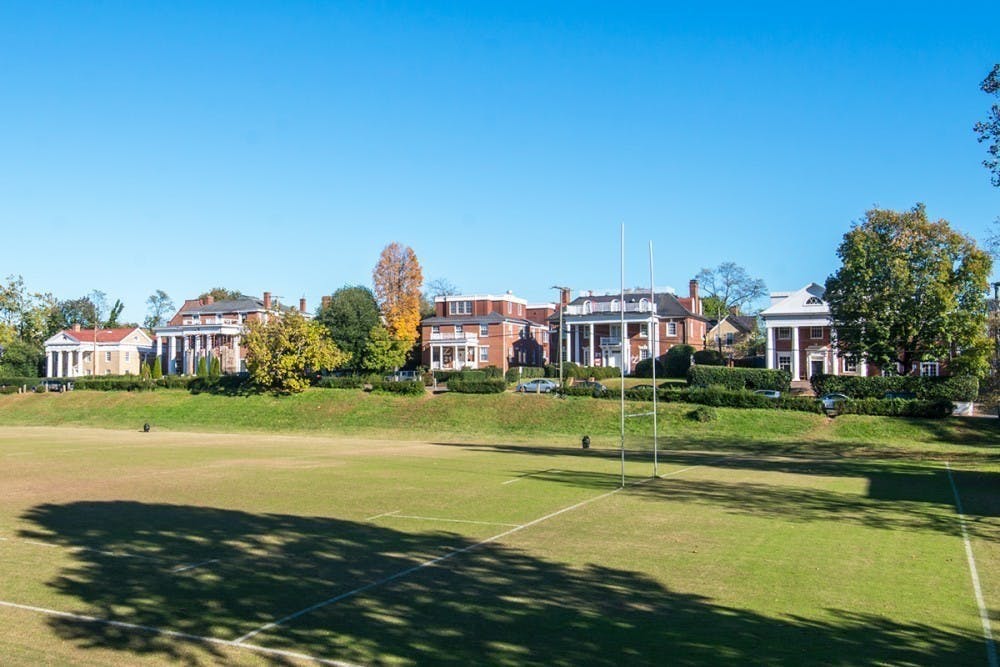As the University’s Greek organizations enter another recruitment period, the Inter-Fraternity Council and Inter-Sorority Council have opted for a hybrid rush in the face of increasing COVID-19 cases on Grounds. Through recruitment, over 4,000 members of Greek life interact with nearly 2,000 prospective members vying to join a fraternity or sorority, on an average year. The first weekend of in-person recruitment activities is approaching — yet, hospitalizations at U.Va. Health are at an all-time high and there are more than 400 active cases of COVID-19 on Grounds. With roughly one-third of the student body actively involved in recruitment, it is unacceptable to act without utmost caution — we demand that the IFC and ISC reverse course and make rush completely virtual this recruitment cycle. Moreover, while the University has vaguely discouraged large gatherings, it must also take responsibility for its own lack of concrete restrictions — or even any mention of recruitment — in updated public health guidelines.
This conversation isn’t new — last spring, COVID-19 cases sharply increased following in-person recruitment. More than 500 cases of COVID-19 were recorded in a single week following recruitment, forcing the University to put students under a stay-at-home order for 10 days. Administration denied that Greek life was a significant cause of the increase in cases, but later confirmed that cases of COVID-19 violations had been brought against five fraternities. There is no evidence to suggest that history will not repeat itself. This is especially true considering that the IFC, though admitting instances of violation, failed to take accountability for its own policymaking’s role in last spring’s dramatic uptick in cases.
We would be remiss if we did not recognize the disparity between the intended recruitment process for sororities and fraternities. The IFC has permitted fraternities to begin their in-person round of rush on Jan. 29, to extend through Feb. 5. Those rushing fraternities will be allowed to eat and drink outdoors, as well as gather in-person — an interesting choice, given that the University instituted a ban on eating and drinking at events ahead of the semester. While the ISC also plans to hold in-person recruitment events, the organization plans for just three days of in-person recruitment rounds and an in-person bid day, falling short of the IFC’s eight-day plan. Chapters are not permitted to provide food or beverages to potential new members. These differences in policy are reminiscent of last year, when the IFC also instituted a much more relaxed approach to recruitment as opposed to the ISC. While both organizations’ decisions to hold in-person recruitment events are both irresponsible and risk public health, we cannot place the ISC and the IFC in the same boat. The rights of men to party are not more important than public health.
We also cannot ignore the University’s resounding silence on the recruitment process, especially considering its failure to institute truly-protective public health guidelines. We are ashamed to see administration fail to act in the best interest of public health yet again. While it is true that completely stopping the spread of omicron is unlikely, the University’s nonchalance toward a future rise in cases is embarrassing — particularly so when a potential major cause is perfectly preventable.
Perhaps most importantly, rush does not occur exclusively in fraternity and sorority houses. Fraternity rush involves current members taking rushees to dinner and other social outings in the Charlottesville area — and sometimes even other cities. This jeopardizes the health of the surrounding community, with students possibly transmitting or catching COVID-19 in local bars, restaurants and other public settings. In-person events only increase the likelihood that both current Greek life members and rushees will further transmit the virus to non-rushing students. When the risks are this big, it’s worth reminding the University — rush is not more important than the classes we pay thousands of dollars to take. Rush is not more important than other extracurriculars that will be jeopardized if post-recruitment cases cause the University to reevaluate in-person activities. And most importantly, rush is not more important than anyone’s health — especially those with critical conditions the University has already chosen to ignore.
Without a current plan to mandate weekly testing, we will have no way of knowing just how much this semester’s recruitment process will affect our community. But between the omicron variant’s transmissibility and last year’s precedent for Greek life’s negligence, one thing is for certain — in-person recruitment will harm our community. To the ISC and IFC, there is still time to do the right thing — move recruitment online. Should the IFC and ISC not independently make this change, we demand that the University swiftly mandate an entirely-online recruitment. If not, the University will be complicit in rising cases and hospitalizations, and that is neither good nor great.
The Cavalier Daily Editorial Board is composed of the Executive Editor, the Editor-in-Chief, the two Opinion Editors, their Senior Associate and an Opinion Columnist. The board can be reached at eb@cavalierdaily.com.





